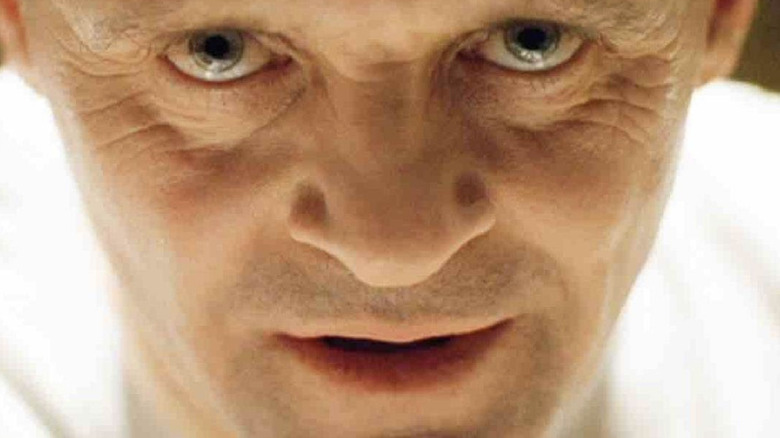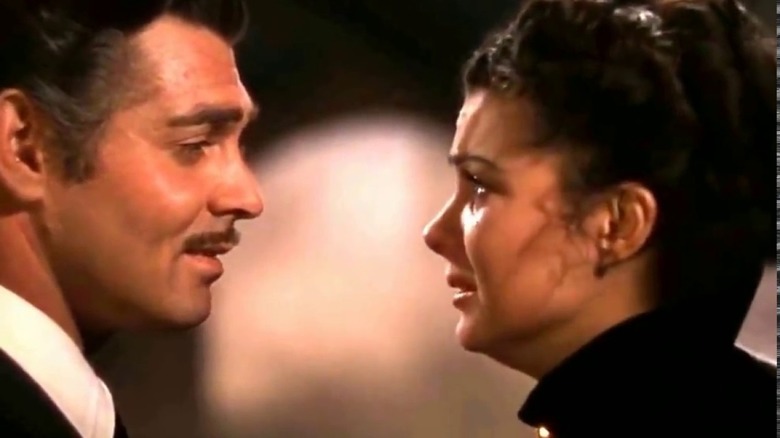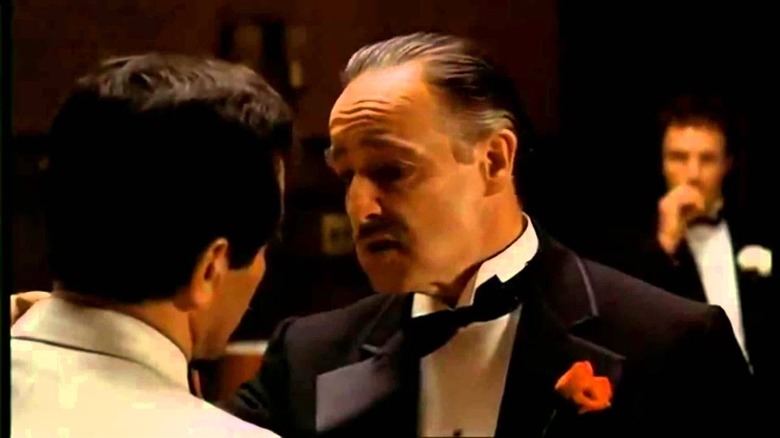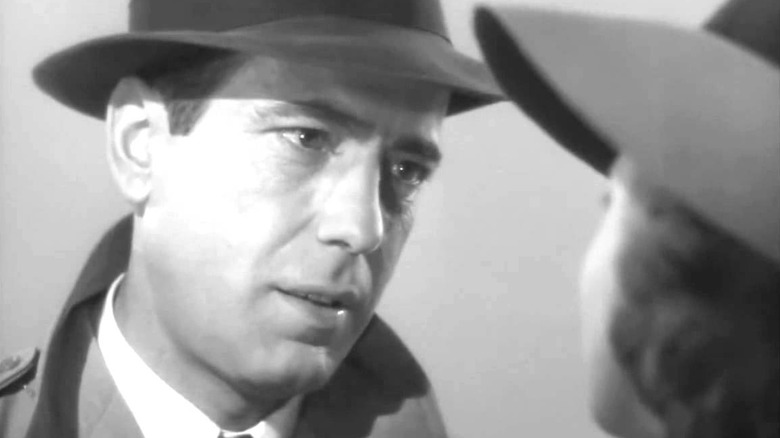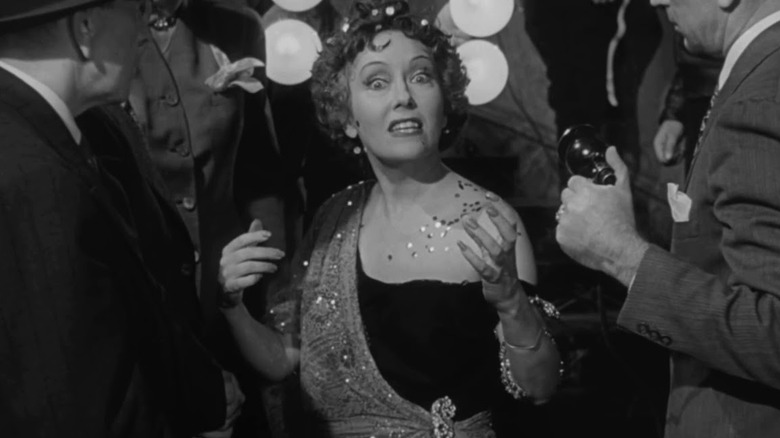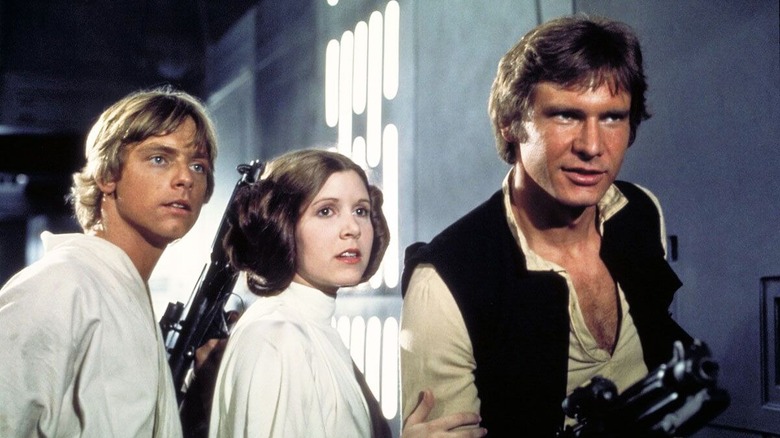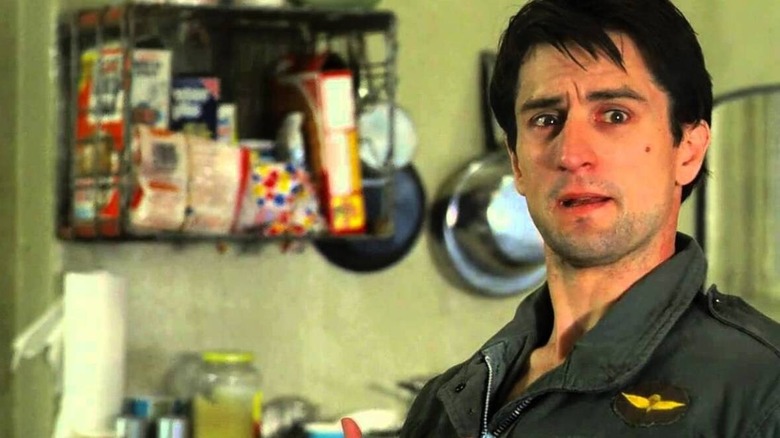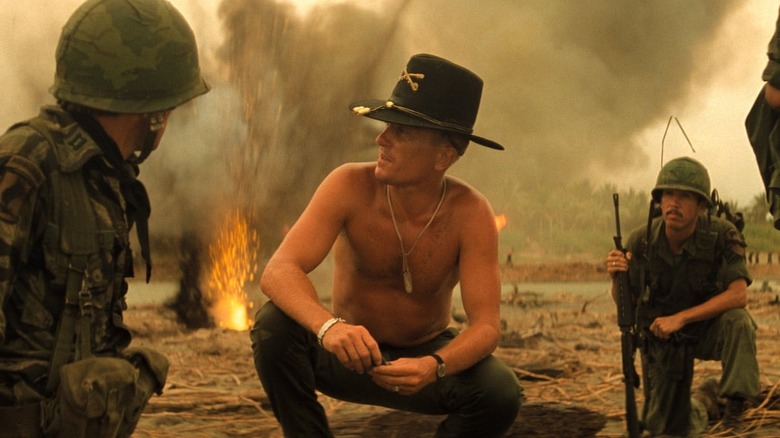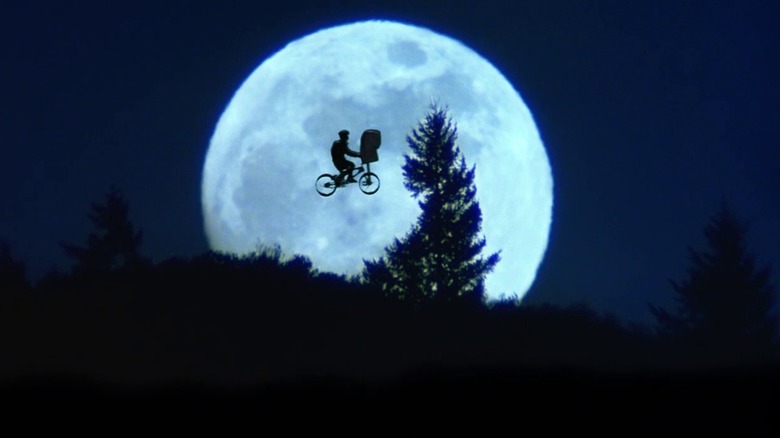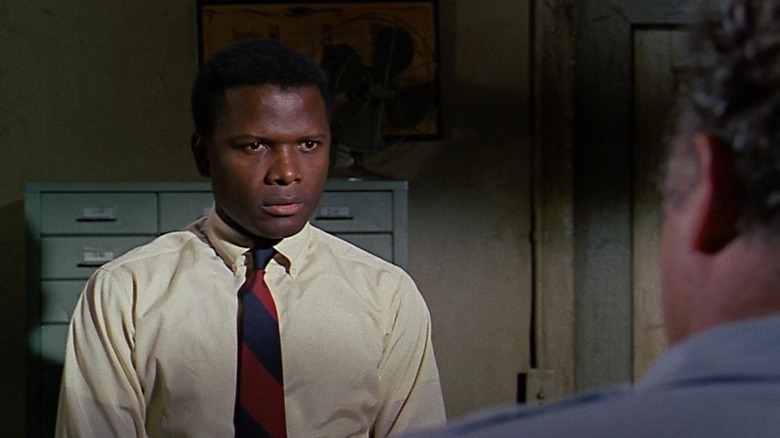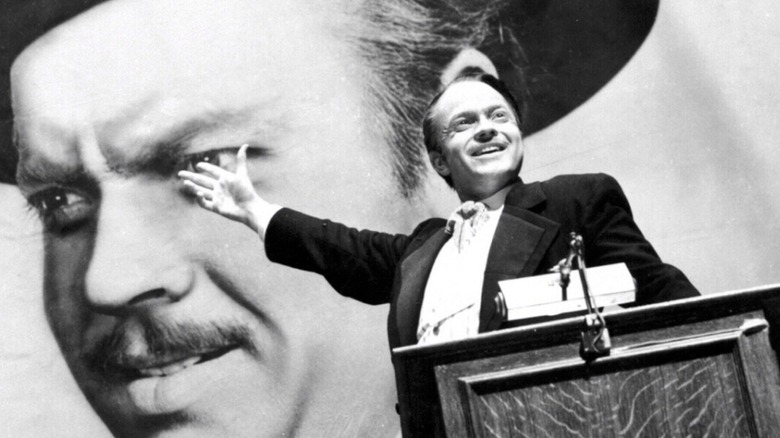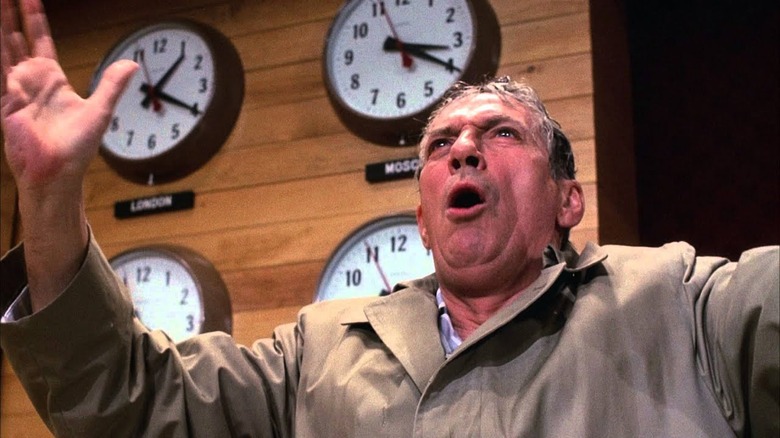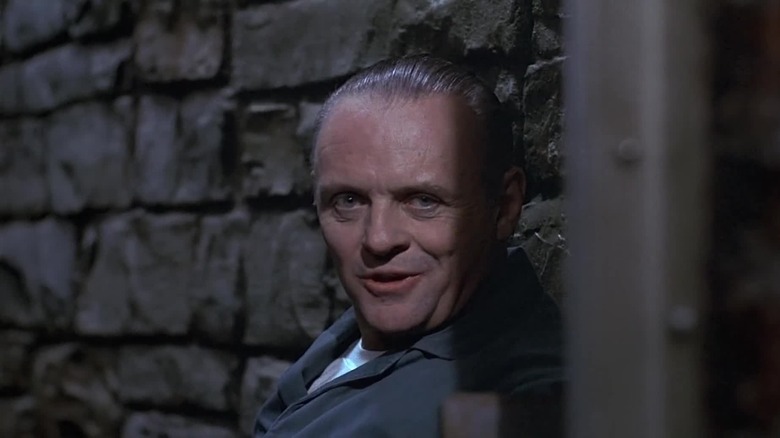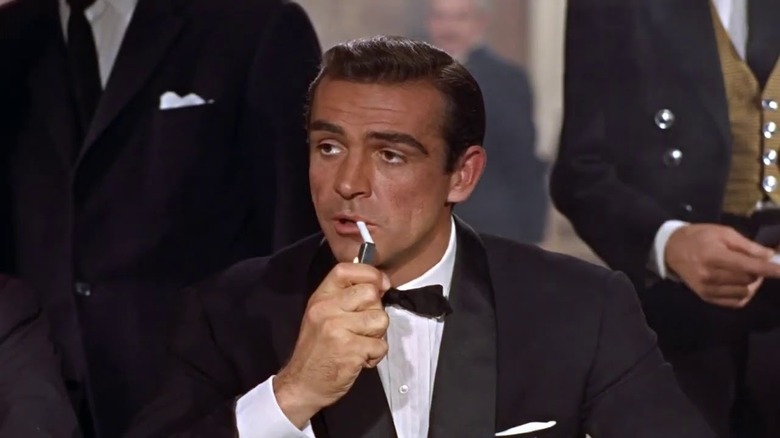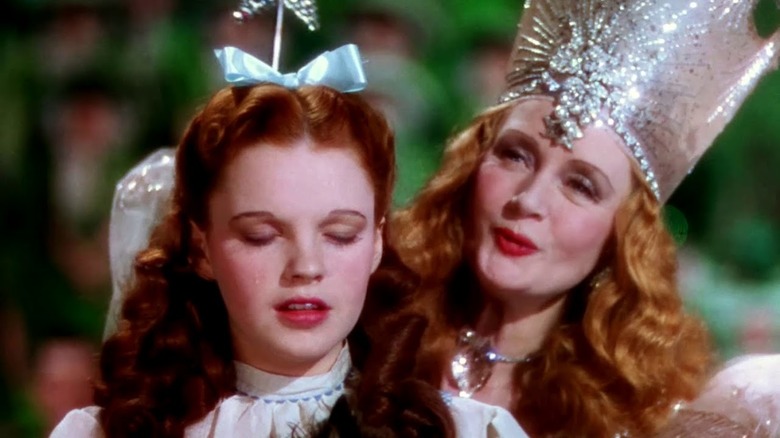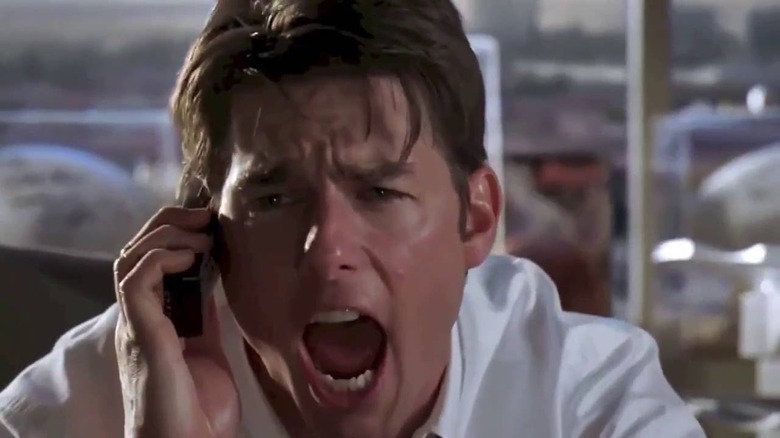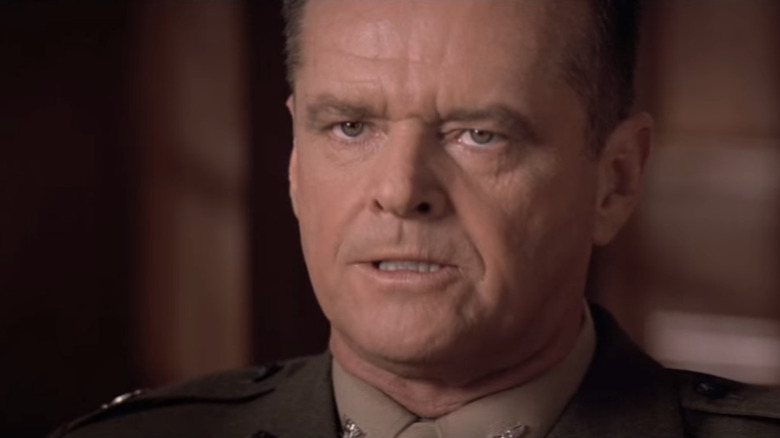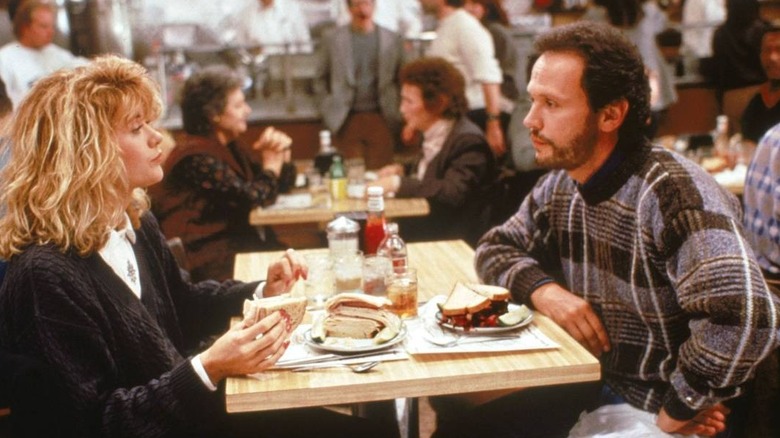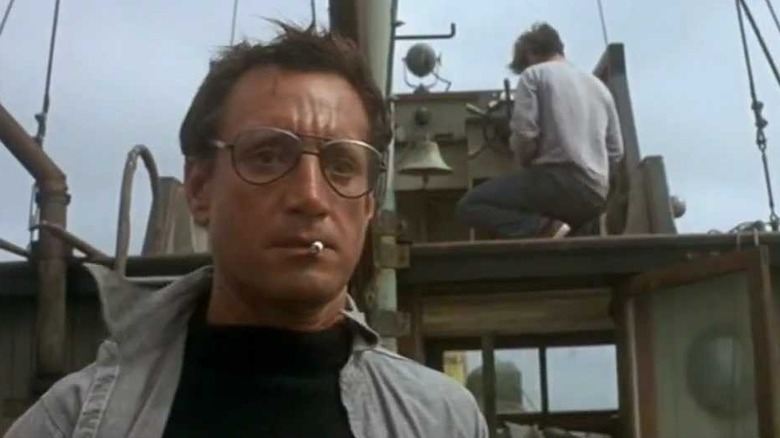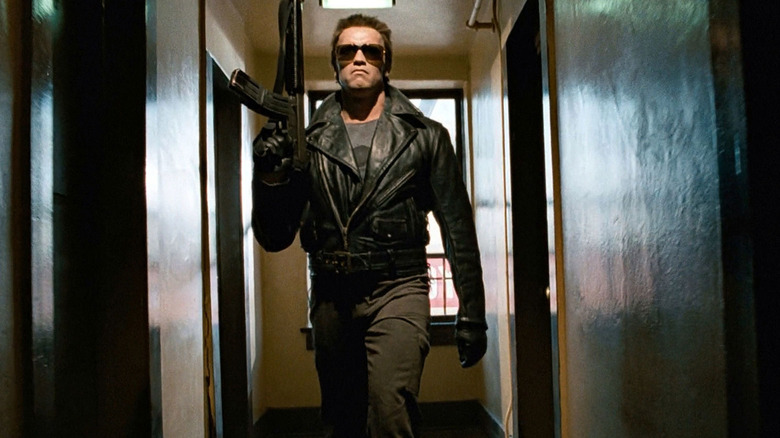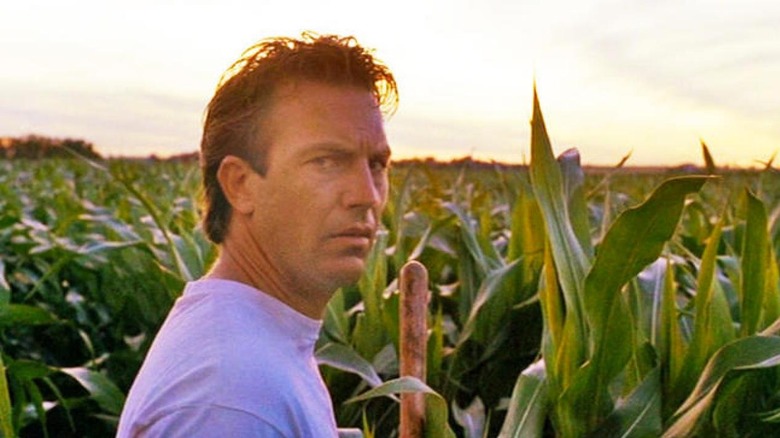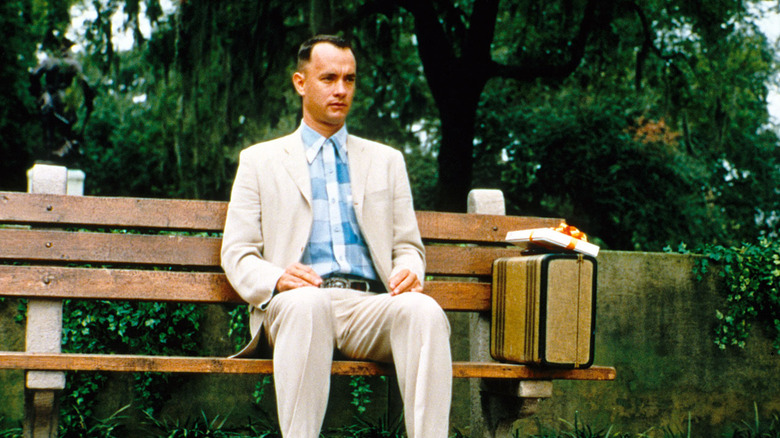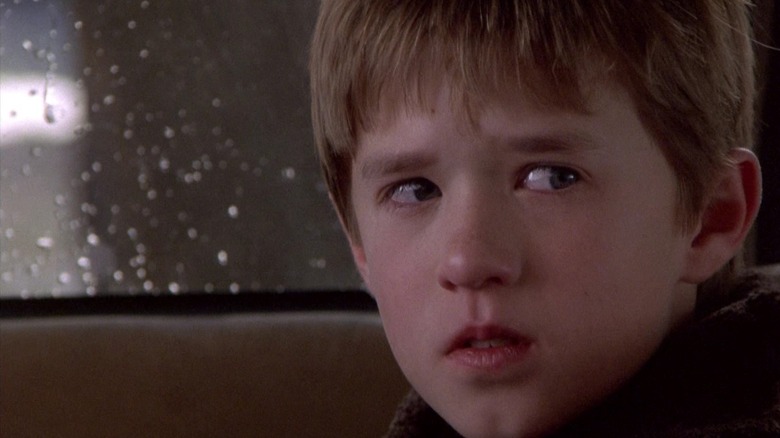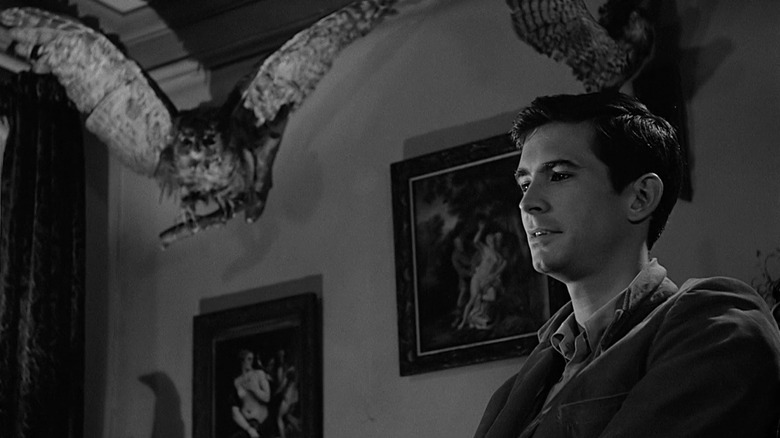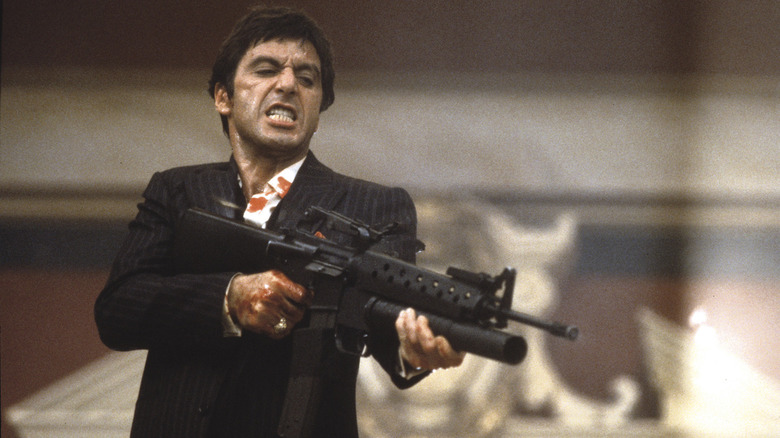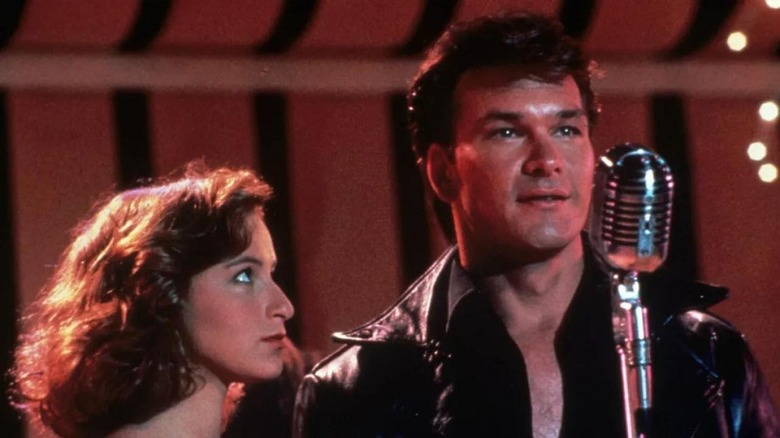Most Memorable Quotes From Movies
Much like iconic song lyrics, movie quotes are something that just sticks with you, launching to the front of your brain whenever a certain circumstance triggers it — and the particularly memorable ones have the power to remain with you forever. Whether they make you laugh, cry, or just give you something to ponder as the credits roll, a movie's script — and sometimes just a single word or sentence — can evoke powerful emotions.
For some of these memorable lines, they've transcended the films they originated from to become part of our language, referenced throughout pop culture and quoted so often they may as well have come from Shakespeare. When others in your orbit are familiar with the quote — and the context behind it — the result is something akin to a verbal meme, shorthand for exactly what needs to be said at that given moment.
There really is a movie quote for every occasion, it seems, and everybody has their favorites. With that in mind, the American Film Institute (AFI) has compiled a list of the 100 greatest movie quotes, those that everybody should know — and if you don't, you need to see more movies. Here's a selection of some of the very best, and the context in which they appear.
"Frankly, my dear, I don't give a damn."
In the sweeping historical romance "Gone With the Wind," the tumultuous union of Scarlett O'Hara (Vivien Leigh) and Rhett Butler (Clark Gable) reaches a dramatic conclusion with this unforgettable moment. After years of loving Scarlett while she was in love with another, Rhett finally gives up on their relationship and rebuffs her tearful plea of "Where shall I go? What shall I do?" with these immortal words, walking off into the fog and leaving her alone. It's one of the all-time classic film endings, as well as arguably the best final line ever written.
With the strict Motion Picture Production Code of the time in place, this line could've been very different. However, an amendment in 1939 allowed exceptions for a "quotation from a literary work," and since "Wind" was based on Margaret Mitchell's bestselling novel, the "damn" was given a pass.
"I'm going to make him an offer he can't refuse."
On the surface, it feels like a simple statement of intent. But keep in mind, this line is spoken by mob boss Vito Corleone (Marlon Brando) in "The Godfather," so suffice it to say there is an implied threat attached to it — the kind of threat no one can ignore.
In this case, Corleone's godson Johnny Fontane (Al Martino) is a struggling singer, convinced that the only way to rescue his declining career is to star in an upcoming Hollywood film. With studio head Jack Woltz (John Marley) reticent to give Fontane the part, Corleone decides to take matters into his own hands. The lesson learned here is you better accept the offer — otherwise, you might just wake up next to a horse's head.
"Here's looking at you, kid."
After their fleeting romance in Paris, Rick Blaine (Humphrey Bogart) and Ilsa Lund (Ingrid Bergman) drift apart, only to meet again in Rick's "gin joint" in Casablanca. This bittersweet love story has one of the most heartbreaking Hollywood endings of all time, as Rick decides to help Ilsa's fugitive husband escape, leading her to believe she will stay in Casablanca with Rick.
At the last minute, however, Rick makes Ilsa get on the plane, telling her she would regret it if she didn't. As they say a tearful goodbye, Rick lets her know he still loves her with these affectionate parting words, and an iconic movie moment is born.
"All right, Mr. DeMille, I'm ready for my closeup."
In "Sunset Boulevard," former silent-movie star Norma Desmond (Gloria Swanson) glides down her grand cascading staircase and is every inch the Hollywood star. But it has been a long time since Norma was a star, and the silent movie legend has been so gripped by her desire to make a comeback to the silver screen that she has been living in an elaborate, demented fantasy, leading her to shoot screenwriter Joe Gillis (William Holden). Following the murder, her house is filled with police and reporters, but Norma's demented state of mind has her believing the cameras are there to shoot her latest film. A shell of her former self, Desmond utters these infamous words as she steps towards the cameras, completely unhinged.
"May the Force be with you."
A line so memorable it now has its own day, these familiar words from "Star Wars" have become something so much bigger than the film they came from. They've been spoken in almost every "Star Wars" iteration since they first appeared in the film we now call "A New Hope," but their first utterance doesn't come from who you might expect. The line is often wrongfully attributed to Obi-Wan Kenobi (Alec Guinness) — instead, he tells Luke "The Force will be with you, always" — and it is minor character General Dodonna (Alex McCrindle) who first says the line as Luke (Mark Hamill) and the other X-Wing pilots are briefed for the mission to attack the Death Star.
"You talking to me?"
Addressing no one apart from his reflection, Travis Bickle (Robert DeNiro) practices his intimidation techniques in this oft-quoted monologue. Throughout "Taxi Driver," Scorsese alternates between us observing Bickle's unusual behavior, and positioning us directly in his headspace, exploring the psyche of the disturbed driver.
At this moment, the two collide as Bickle decides he needs to take matters into his own hands to clean up the streets. The fact that Bickle rehearses this imagined confrontation scenario is both darkly comedic and terrifying, marking a huge turning point for the character while demonstrating his spiraling mental state.
"I love the smell of napalm in the morning."
Most people like to start their day with the smell of fresh coffee. For Lieutenant Colonel Kilgore (Robert Duvall) in Francis Ford Coppola's "Apocalypse Now," however, it is the smell of napalm that rejuvenates him. Surrounded by the chaos of war, the wistfully nostalgic way Kilgore says these famous words makes it clear he has found his happy place, providing a stark contrast to the living hell being depicted on screen. The line perfectly demonstrates the confidence that radiates from Kilgore, who — despite being in an incredibly dangerous situation — doesn't smell the threat around him, only victory.
"E.T. phone home."
With a limited vocabulary, the titular alien of this 1982 classic is a character of few words, but the few things he does say have a massive impact. When Elliott's (Henry Thomas) younger sister Gertie (Drew Barrymore) teaches the alien how to say a few words, he is able to communicate to his new friends that he wants to "phone home" and make contact with his family. As heartwarming as the friendship is between Elliott and E.T., it is a bittersweet reminder that the alien doesn't belong in this world forever — making the tear-jerker ending all the more devastating.
"They call me Mister Tibbs!"
This memorably defiant line from "In The Heat Of The Night," spoken by Black police officer Virgil Tibbs (Sidney Poitier), is all about the delivery — and the way it instantly commands respect.
Assigned to a murder case that he is initially mistakenly arrested for, Tibbs frequently clashes with the racist police force of Sparta, Mississippi, particularly Chief Bill Gillespie (Rod Steiger). Despite the fact Tibbs has just made a potential breakthrough on the case, Gillespie repeatedly disrespects him by calling him by his first name. Tibbs finally snaps when Gillespie uses a slur towards him, and he powerfully responds with this unforgettable declaration, which is the only quote here that became so well known it was turned into the title of a sequel.
"Rosebud."
Rarely has one word had so much meaning. But say the word "rosebud" to anyone and unless they're a horticulturist, chances are they'll think of "Citizen Kane," long considered by many to be among the greatest films ever made.
Orson Welles' masterpiece begins with the end of the life of Charles Foster Kane (Welles), as the media tycoon drops a snowglobe and speaks his final words, "rosebud." A reporter is then tasked with getting to the bottom of the mystery behind one of the world's most successful men, interviewing Kane's friends and associates and discovering there was far more to the man than what was reported in his newspapers. The beauty of this line is two-fold: Revealed at the end in a way that keeps the secret between Kane and the viewer, "rosebud" was supposedly an NC-17 nickname employed by the film's none-too-pleased inspiration, William Randolph Hearst.
"I'm as mad as hell, and I'm not going to take this anymore!"
Thanks to 1978's "Network," we have the perfect line to quote when pushed to the breaking point. Bitter, old and on the verge of losing his job, newsman Howard Beale (Peter Finch) decides he isn't going to go quietly into the night, launching an angry, on-air tirade about the horrible state of the world, urging viewers to go their windows and shout this catchphrase along with him. It seems like the best way ever to get yourself fired.
But here's the kicker: it makes him a TV sensation. Now dubbed "The Mad Prophet of the Airwaves," the lifelong news reporter is suddenly a sideshow, ranting and raving every night to 62 million people. Looking at all the screamers and doomsday prophets on cable TV today, is there any doubt director Sidney Lumet and writer Paddy Chayefsky were predicting a sad future yet to unfold?
A scathing, brilliantly-written attack on television, "Network" is a film that feels as relevant today as it did then.
"I ate his liver with some fava beans and a nice Chianti."
Pulled from her FBI training, Clarice Starling (Jodie Foster) is assigned to interview Hannibal Lecter (Anthony Hopkins), an incarcerated cannibal who could be useful in getting inside the mind of a serial killer on the loose known as "Buffalo Bill." Throughout Clarice and Hannibal's iconic first meeting in "The Silence of the Lambs," it is evident that the man in prison holds all the power, unnerving Clarice with his particularly keen sense of smell and peculiar mannerisms.
When Clarice challenges him to "point that high-powered perception at yourself," Hannibal responds by letting her know exactly what he did to the last person who tried to test him.
"Bond. James Bond."
With this quotable introduction, a cinematic icon was born, and even now when people want to feel like the suave gentleman spy himself, they may choose to introduce themselves in this way. Spanning many books and films, Ian Fleming's creation has become a pop culture icon, and it was back in 1963 that cinema audiences were first introduced to him in the film "Dr. No."
Effortlessly cool, Bond (Sean Connery) sits smoking a cigarette at a casino table and lets the world know his name, as the famous theme music kicks in. The movie world — and the lives of any real-life people who happen to share his name — would never be the same again.
"There's no place like home."
The image of Dorothy (Judy Garland) tapping together the heels of her red shoes as she expresses her desire to go home is one of cinema's most iconic, and this wistful phrase instantly conjures up warm, nostalgic feelings.
With the help of the Scarecrow, Tin-Man, and Cowardly Lion, Dorothy has traveled the length and breadth of Oz, battling wicked witches, just trying to get back home. When it seems all hope is lost, Glinda the Good Witch tells Dorothy she has always possessed the power to get home. On her journey, Dorothy learns the important lesson of gratitude — to appreciate what she has in Kansas — and this (along with those magic words) gives her the power to return.
"Show me the money!"
Formerly a cocky, successful sports agent, Jerry Maguire (Tom Cruise) reaches a turning point in his career where a change of heart looks like a sign of weakness. Now going it alone as an independent agent, Maguire is desperate to keep clients, but only one — Arizona Cardinals wide receiver Rod Tidwell (Cuba Gooding Jr.) — continues to stand by his side.
After a particularly impassioned phone call, Maguire and Tidwell end up sing-songing the line "show me the money!" to each other as a galvanizing statement of intent. Repetition certainly helps a quote stick in your mind, with this one said back and forth between Gooding Jr. and Cruise, getting funnier and louder each time. "Jerry Maguire" also gave us the iconic quote "you had me at hello," making it a rare film that has two quotes in the AFI's Top 100 list.
"You can't handle the truth!"
When a film is scripted by Aaron Sorkin, you know it's guaranteed to have powerful, rapid-fire dialogue coming at you like its being spit out of a Gatling gun, and in the climactic courtroom scene of "A Few Good Men," we get some of the very best.
Lt. Daniel Kaffee (Tom Cruise), assigned to defend two Marines accused of murder at Guantanamo Bay, is fighting to prove their innocence. When it emerges that the man was killed during a hazing ritual, Kaffee interrogates the tough Col. Nathan Jessup (Jack Nicholson) to try and bring the truth to light. Kaffee's persistence and demand for the truth result in these famous words from Jessup, barking them like a caged animal backed up against a wall. While these particular words might be the most enduring from the film, Nicholson's entire monologue — ending with the crucial confession — is exceptional.
"I'll have what she's having."
In director Rob Reiner's romantic comedy "When Harry Met Sally..." the question is posed about whether men and women can be "just friends." For Harry (Billy Crystal) and Sally, (Meg Ryan) this does seem to be the case initially — but in this beloved exploration of the theme, attraction rules the day.
In the film's famous diner scene, Harry and Sally discuss a woman's ability to fake things, and the man's inability to know the difference. To prove her point, Sally begins a very public demonstration, much to the shock of their fellow diners. When the performance concludes, an older lady perfectly punctuates the moment with those unforgettable words. Making the scene even more perfect? The woman in the diner was Estelle Reiner — mother of Rob.
"You're gonna need a bigger boat."
When Chief of Police Martin Brody (Roy Scheider) finally manages to convince the townspeople of Amity that they need to sort out their shark problem, he sets sail with marine biologist Matt Hooper (Richard Dreyfuss) and grizzled fisherman Quint (Robert Shaw). Tasked with throwing the "chum" out to sea to lure the shark to them, the great white suddenly pops up behind Brody, who then slowly backs into the cabin to let Quint know – they've got a big problem on their hands and they're ill equipped.
According to "Jaws" screenwriter Carl Gottlieb (via The Hollywood Reporter), the line was something the crew used as a catchphrase for whenever anything went wrong, which happened frequently. Not only is it an enduring line for movie fans, but it is the perfect phrase to demonstrate the huge task the characters are facing and the massive undertaking involved in making the film, simultaneously.
"I'll be back."
It's only three words, but you instantly know what film they come from and the character that speaks them.
In 1984's sci-fi action classic "The Terminator," we are introduced to the titular cyborg assassin (Arnold Schwarzenegger), sent back in time to kill Sarah Connor (Linda Hamilton) before her unborn child can become the future leader of the humans as they defend themselves against the machines. In pursuit of Connor, The Terminator arrives at a police station in his iconic leather jacket and sunglasses. After calmly asking to see Connor, he is rebuffed, leading to those three words; of course, when he does come back, all hell breaks loose.
"No one, not Jim Cameron or anyone else, knew when he wrote the line and I said the line that it would ever be repeated again," Schwarzenegger, who was known to employ it during press conferences when he was Governor of California, said in a 2019 interview. "This was something that was really surprising to all of us when the movie came out."
"If you build it, he will come."
When Iowa farmer Ray Kinsella (Kevin Costner) hears this ethereal whisper while out in the cornfields surrounding his home, he decides to build a baseball diamond and is soon surprised to see ghosts of former legends (most notably, disgraced slugger "Shoeless" Joe Jackson) at play. "Field of Dreams" is a strange film on the surface — Is it a sports movie? A film about father and sons? About following your conscience? — but underneath it all is a pervasive, heartwarming message about second chances and the healing powers of America's pastime. Steeped in allegory, the film speaks to the power of dreams and the assurance of faith, with it all encapsulated in this statement.
"Mama always said life was like a box of chocolates. You never know what you're gonna get."
Many film quotes offer sound life advice, and that is certainly the case with this confectionary-inspired line from "Forrest Gump." We meet Forrest (Tom Hanks) sitting on a bench, telling his life story and the words of wisdom his "Mama" gave to him throughout his life, to anyone who sits long enough to listen. The famous quote infers that life is full of surprises, and Forrest's life is certainly an extraordinary one. As the film unfolds, we see several key historical events of the 20th Century – many of which he unwittingly played a part in — from his unique perspective. The film itself is also full of surprises, another reason why this quote is a perfect fit.
"I see dead people."
One of the most chilling quotes in any film, this line — spoken by the troubled young boy Cole Sear (Haley Joel Osment) — is not only frightening, but one that gains potency after the film's surprising twist ending.
Child psychologist Malcolm Crowe (Bruce Willis), working with Cole to encourage him to open up about what is afflicting him, believes he is helping the boy. The powerful thing about this line is the influence it has on the rest of the film — when Cole reveals that he can see the dead, we start to see the terrifying ghostly visions he has as well. Oft-parodied but unbeaten, this line has the power to give you goosebumps, just thinking about it.
"A boy's best friend is his mother."
On the run, Marion Crane (Janet Leigh) arrives at the isolated Bates Motel and meets its unusual proprietor, Norman Bates (Anthony Perkins). At this point, Marion has no clue about the danger she is in, and Norman — while certainly a bit odd — seems personable and friendly enough not to raise an alarm.
The subtlety of this line from "Psycho" is one of the brilliant things about it. While at the time it suggests little more than Norman being hen-pecked by his overbearing mother, it masks the dark secret that makes the film's shocking reveal a classic.
"Say 'hello' to my little friend!"
With an armed hit squad closing in on crime boss Tony Montana (Al Pacino), he's forced to make one final stand. Never one to be caught unprepared, he's got the firepower to do it — an AR-15 assault rifle and a grenade launcher. Brian De Palma's bloody, brutal masterpiece is packed with shocking displays of violence; this particularly notable line, however, elevates it above the rest. Taking heavy fire and surrounded by mounds of cocaine, Montana knows he isn't going to survive this onslaught — but is determined to go out in a blaze of gunfire.
"Nobody puts Baby in a corner."
Frances "Baby" Houseman (Jennifer Grey) has never been the center of attention, and favors the idea of saving the world over chasing boys. That all changes during one memorable summer family vacation at Kellerman's Resort, when she meets and falls in love with streetwise dance teacher Johnny (Patrick Swayze).
Johnny has a bit of a reputation, something of which Baby's father (Jerry Orbach) is particularly aware. As the season comes to a close, Baby and Johnny will soon have to part ways, and despite knowing the risk it poses to his future at Kellerman's, Johnny is determined to tell Baby how he feels. Before the strains of "(I've Had) The Time Of My Life" kick in, Johnny pulls Baby out of the corner and gives the girl her moment in the spotlight.
